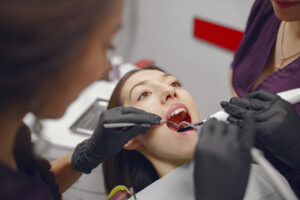We all want whiter teeth. This is evident by the ever increasing list of teeth whitening toothpastes, mouthwashes and gels promising whiter than white teeth. However, knowing the best treatment to apply is never black, nor dare we say it, white.
Before going down the teeth whitening path, it pays to know a bit about the teeth whitening process so you can make the best decision for you and your pearly whites.
How do teeth become stained?
When you eat and drink this is mixed with saliva and creates a thin film on the surface of the teeth known as the pellicle. This pellicule layer is mostly removed each time you brush your teeth. However, the pellicle contains tiny fragments of the food and drink and can get absorbed into the outer layer of the tooth enamel. This creates stains within the enamel that regular brushing cannot remove.
Do teeth whitening toothpastes or mouthwash work?
Brushing your teeth twice a day and rinsing with mouthwash is seriously good for your teeth. However, teeth whitening toothpastes and mouthwashes are limited in effectiveness to visibly whiten teeth. Also, some whitening agents may do more harm than good depending on the active ingredients involved.
- Bleaching agents - teeth whitening toothpastes contain very low concentrations (less than 0.1%) of hydrogen peroxide. This is also shown as carbamide peroxide or sodium perborate which essentially break down to hydrogen peroxide in air or water. It is unsafe and illegal to sell toothpaste with a high concentration of hydrogen peroxide as it can burn the gums and cheeks.
- Abrasive agents - some toothpastes aim to whiten teeth using abrasive agents like baking powder. These will remove stains but also will remove small amounts of enamel. Enamel does not grow back and teeth can become more sensitive and prone to decay the more that enamel is removed.
Are over-the-counter teeth whitening gels effective?
Much like teeth-whitening toothpastes, over-the-counter whitening gels contain mild concentrations of bleaching agent (usually up to 6%). So this won’t be as effective as higher concentration gels prescribed and properly administered by a dentist. Dentists take certain precautions to prevent the bleaching agent affecting the gums and cheeks.
Why should I see a dentist to whiten my teeth?
Before making any change to your dental routine, getting the right advice is a great idea. Dentists provide a number of benefits when supervising the teeth whitening process:
- Whitening effectiveness - Dentists can legally apply a higher concentration of hydrogen peroxide to your teeth. This can go up to 35-40% for in-chair treatments so is far more effective in whitening teeth. Dentists apply guards to protect the gums along with clear retainers moulded to your teeth to keep the whitening agent on your teeth for longer and as part of at-home treatments.
- Getting the perfect white - Dentists can better control the shade of white that will suit you and your complexion. For instance, a rule of thumb says your teeth colour should match the whites of your eyes for the best, most natural look. A dentist is better equipped to control the degree of whiteness so your teeth look healthy and natural.
- Teeth quality - most people are unaware that teeth whitening/bleaching does not work on fillings, dental crowns or veneers. A dentist can check your pre-existing dental work to advise on the best teeth whitening strategy either before or after dental work.
- Oral health - Whiter teeth draw attention. So, it makes sense to have your teeth looking their very best. Replacing missing teeth, treating gum disease, getting teeth straightened or planning for veneers soon after whitening is the sort of advice a dentist can provide as part of your dental makeover.
In-chair whitening vs at-home whitening, which is better?
With a dentist, you may have the option of getting your teeth whitened in the dentist’s chair or using prescribed treatment to apply at home.
The differences of these treatments including benefits and considerations include:
In-Chair Whitening
Benefits:
- Faster results - due to the higher concentration of bleaching agent possible.
Considerations:
- Sensitivity - some people might find the stronger bleaching agent uncomfortable
- Cost - an hour long monitored treatment in the dentist can cost more than at home treatments
- Not as long lasting - some studies have shown the faster acting whitening does not last as long.
At-Home Whitening
Benefits:
- Convenient - can be done at home and overnight in your own time
- Longer lasting - studies have shown teeth remain whiter for longer
- Cost-effective - no costly in-chair dental work required
- Can be re-applied - simply buy more whitening gel from your dentist
Considerations:
- Requires retainers - retainers need to be moulded by the dentist for your teeth.
- Takes longer to achieve results - given the strength of bleach is lower for at home treatments. We suggest the best results are over a 5 to 14 day period. If you are doing a top up every year, you may just need a few applications.
How long does teeth whitening last?
Teeth whitening treatments can last from 6 months up to 3 years. This depends on your oral hygiene and also by avoiding (or limiting) the consumption of certain foods, drinks and habits. Tea, coffee and red wine can stain teeth quite easily. So too can foods like beetroot and berries. Also, tar and nicotine from cigarettes easily absorbs into the enamel. Nicotine, while colourless, turns yellow when exposed to oxygen so e-cigarettes should also be avoided.
If you choose to go down the teeth whitening path, it makes sense to do it with the right advice. Your dentist can advise what treatment is recommended for what you want to achieve. Your dentist can rectify any underlying teeth issues either before or after your treatment and advise on the best shade of white to aim for. Then after getting advice on your most appropriate teeth whitening method, you’ll be flashing your bright white teeth before you know it.
Dr Finkelstein Dentist in Sydney CBD is experienced in teeth whitening treatments. Dr Finkelstein prescribes Boutique Whitening treatment for his patients. After a consultation, we can have you on a safe path to whiter, brighter and healthier teeth.








